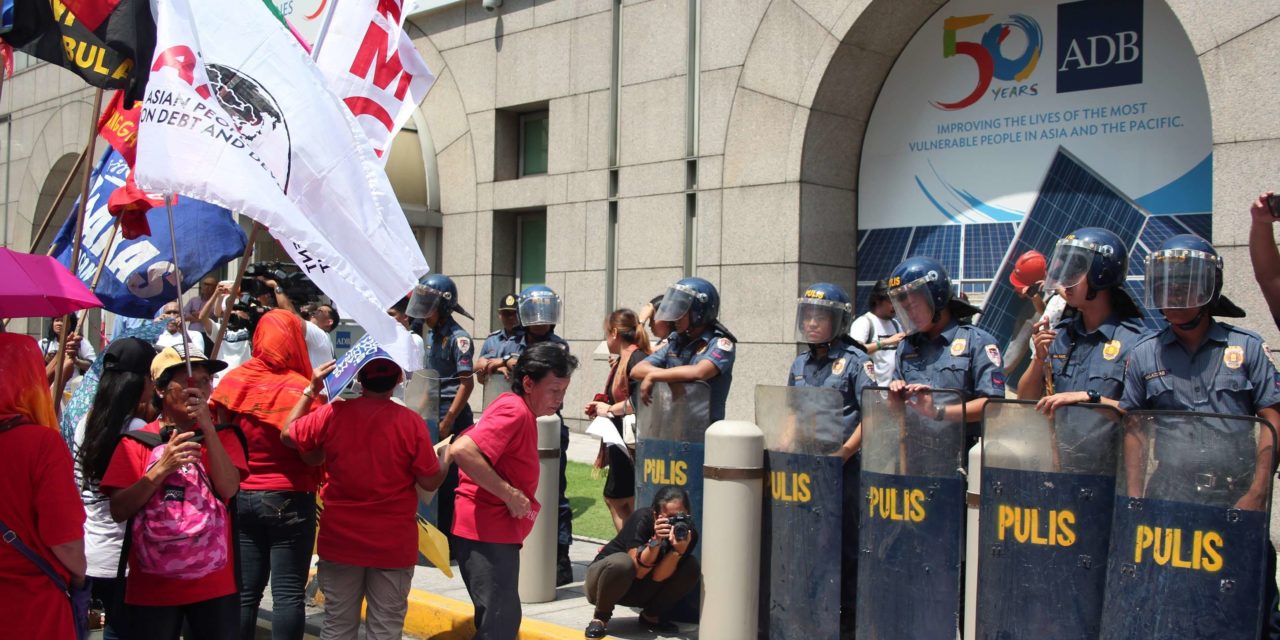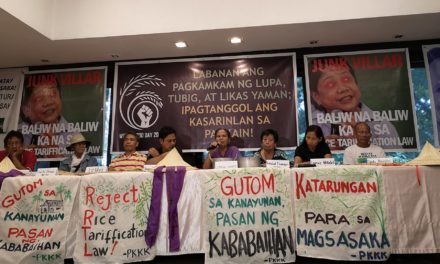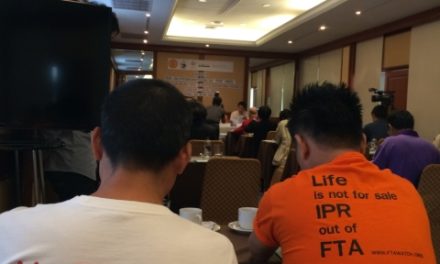April 20, 2017
Preamble
Since 1966, the Asian Development Bank (ADB) has peddled the illusion that it is an institution committed to making the region free from poverty. According to the Bank, it has mobilized more than USD 250 billion worth of investments in infrastructure, research, and knowledge sharing in its half a century of operations in Asia and the Pacific. The ADB, however, shamelessly continues to shell out illegitimate debts to its member countries even if it had disastrous project and policy outcomes. Fifty years of ADB operations has left a track record of people displaced, impoverished, malnourished, and hungry. The destructive impacts spread across all facets of the environment: forests, rivers, oceans, arable lands including endangered and close-to-extinction animal and plant species in their habitats. The ADB is also guilty of contributing to global warming through its financing of dirty energy projects.
We, the community representatives, youth associations, students, and civil society organizations gathered here on the 19th – 20th of April 2017 at the University of the Philippines SOLAIR declare that,
- ADB has an exploitative development model – ADB’s business model has a narrow view of development that looks at the state as the principal driver of economic growth. It has capitalized on this notion through the setting up of Country Partnership Strategies (CPS) and policy reforms (Structural Adjustment Programs, Technical Assistances on policy, financial and governance reforms) which identified key sovereign sectors and resources to exploit for export-oriented profit through the private sector players. ADB has been forcing governments (abusing its power as a lender) to acquire customary natural resources and crafting a fictitious narrative of government dependency on ADB; all for the purpose of pushing loans and unlocking private sector opportunities.
- ADB supports tyranny – ADB speaks of good governance and democracy; yet it continues to lend autocratic and oppressive regimes in and fragile conflict areas such as Myanmar, Samoa, Papua New Guinea, North East India, Afghanistan, and Pakistan. Through these lending operations, the ADB aids and abets tyranny and the use of state instruments to grab resources, suppress human rights, and suffocate civil society and all voices of dissent.
- ADB gives False Solutions – The Bank in its hubris thinks of itself as a knowledge provider in Asia and has been very active in the last decade in providing false solutions through its so-called clean energy investments and social investments portfolio (health, education, and agriculture). All these instruments are about unlocking private capital into social development sectors that lead to rising user fees and increasing inequality and debt. In its competition with the Asian Infrastructure Investment Bank (AIIB), ADB feels threatened and is driving for more reckless loans in trans-boundary infrastructure projects and continues to invest in dirty fossil fuels in the face of a burning planet. The Bank remains stoic in its perpetual denial of Human Rights and does not use the term in any of its operational policies and guidelines. In its 50th year, ADB remains adamant in not adhering to core labor standards in any of its projects and operations across Asia. Through the years of critical engagement with ADB’s internal governance mechanisms, we have seen that all its final decisions about the Bank’s compliance with policies and procedures rest with the ADB’s Board of Directors. The ADB then is its own investigator, judge, and jury, with no obligations to external or public accountability. ADBs Immunity allows itself this unbridled freedom as an international organization, but with 50 years of its continuing destructive operational track record, it is critical to challenge this immunity.
Exploring the destructive Impacts of ADB Immunity across thematic sectors we observe that,
1) Financing Dams, Displacement, and Destruction
- ADB financing of dams has brought many disasters to affected communities. A common observation in Bangladesh, Nepal, Kyrgyz Republic, Cambodia, and Laos are the differences between the promises of the ADB and the realities experienced on the ground. In the case of Laos, Bangladesh, and Kyrgyzstan, ADB projects led to the destruction of the environment resulting in the people’s livelihood being affected.
- In particular, the quality of the water downstream of the Xe Bang Fai River in Laos resulted in people in the community nearby experiencing skin diseases. Apart from environmental destruction, compensation to the communities was either undelivered, late, or does not address the plight of the communities affected. There were no consultations with the communities by the ADB. Instead of implementing policies that were for the benefit of the communities, ADB projects in these areas resulted in environmental degradation, loss of livelihood, disease, and disenfranchisement of the community. These have further resulted in Human Rights violations.
- The affected people have had no access to accountability mechanisms because of political and social situations, as in the case of Laos. In Bangladesh as well as in Cambodia, complaints were filed but the problems have not been addressed to this day due to the slow working grievance mechanisms of the Bank. It was clear that economic growth is seen as a priority over the environment, life, and livelihood of the people.
2) Inequality, Debt, and Transfer of Wealth to Private Sector
- While ADB funded projects are responsible for negative social and environmental impacts, they are also responsible for bailing out private sector debts and violation of human rights. This results in the increase in government debts, project delays that still ended up with unmet targets and non-protection of beneficiaries from unjust practices of corporations, lack of environmental and health protection. Resettlement of displaced families has never proven itself effective in livelihood restoration, and instead became the embodiment of failed promises that have caused more damage than development.
- ADB’s immunity should be challenged by debt auditing. Principles on declaring an illegitimate debt are now considered international principle. Therefore, we demand suspension of debt services, and eventually cancellation of all illegitimate debt.
3) The Climate Crisis and Decarbonizing of ADB at 50 years
- ADB’s continued support to the coal sector makes Asian people more vulnerable to climate change, and health and environmental hazard. This has pushed people out of their homes who have become climate-induced migrants/climate refugees. This is a gross violation of human rights including the right to healthy and clean environment.
- Therefore, we demand ADB to stop funding the coal sector and begin decarbonizing Asia. We also demand ADB to prioritize supporting community-based sustainable energy projects. We also demand ADB to take the full responsibility for its contribution to climate change and climate-induced migrants/refugees.
4) Lack of Transparency, Oppression, and Shrinking CSO Space
- ADB propagates the architecture of immunity and impunity by imposing conditionalities, including the amendment of laws to enable benefit sharing with the private sector, failing to ensure compliance to even out its own policies and the national laws and policies. We want that all governments stop exercising power to change laws that favor corporate interest and the interest of the private sector.
- ADB should not support projects that violate the laws and principles of human rights. ADB should not collaborate with governments to push for projects that cause militarization and corruption. Instead of ADB condoning, supporting, and promoting such regimes, ADB should speak out on critical issues like human rights violations and enforced disappearances by oppressive regimes.
- ADB’s immunity leads to impunity, which allows project developers and state actors to ignore people’s rights and corporations to violate national laws and destroy the environment. ADB cannot wash its hands off of these violations and hide behind its immunity.
5) ADB’s Exploitation of Labor
- We have experienced that ADB and private companies do not respect labor rights as it has allowed violations of labor standards throughout its projects. This is particularly seen in the example of the Philippines wherein water districts are either privatized or closed off without due consultation with local officials, unionized workers, and local communities. Therefore, we demand ADB to bring back services to the public sector and introduce more innovative measures of public to public or public to people partnerships on the delivery of public goods and utilities.
- ADB has still failed to implement Core Labor standards, which has led to fundamental rights violations. Those violations cannot be challenged in the local court systems due to the ADB’s immunity. Therefore, we demand ADB to respect the ILO core labor standards in all its operations and also to stop using the immunity to escape charges of labor rights violations.
6) Social Inclusivity and ADB’s Impacts on Vulnerable Groups
- There is no genuine participation for vulnerable communities in ADB operations. ADB has no genuine effort at bringing the consultations down to vulnerable groups such as women, the disabled, and indigenous peoples. Particularly in the case of People with Disabilities, ADB has very little mechanism that enforces empowerment and accessibility.
- Women are more vulnerable to poverty due to relocation projects. Indigenous people also experience violations of their rights rather than the promotion of their welfare particularly in the areas of ancestral domain. Of particular concern are consultations with communities where there have been cases of coercion (militarization). In some situations, CSOs have been labeled as communists, terrorists, and militants illustrating the targeting of critical voices leading to the shrinking of democratic space.
- Therefore, we demand that this should be addressed by looking into the “Road to 2030 strategy” of the ADB and putting a stronger emphasis on pursuing the full range of human rights and allowing democratic space for dialogue.
Asian Peoples Call on Challenging ADB’s Immunity
We further declare that the struggles and evidences above demonstrate that the ADB has failed miserably in its responsibilities to the people of Asia and has no ground to retain its immunity. It is time to call out ADB’s false Immunity claim everywhere across Asia. It has betrayed its trust as a development partner to the borrowing governments and their people and should be held fully responsible for all its actions and impacts.
Therefore, we, the Asian Peoples, call on our governments and people’s representatives to strip ADB’s Immunity and hold it accountable for all its actions against our dignity, our rights, our sovereignty and our mother earth.









